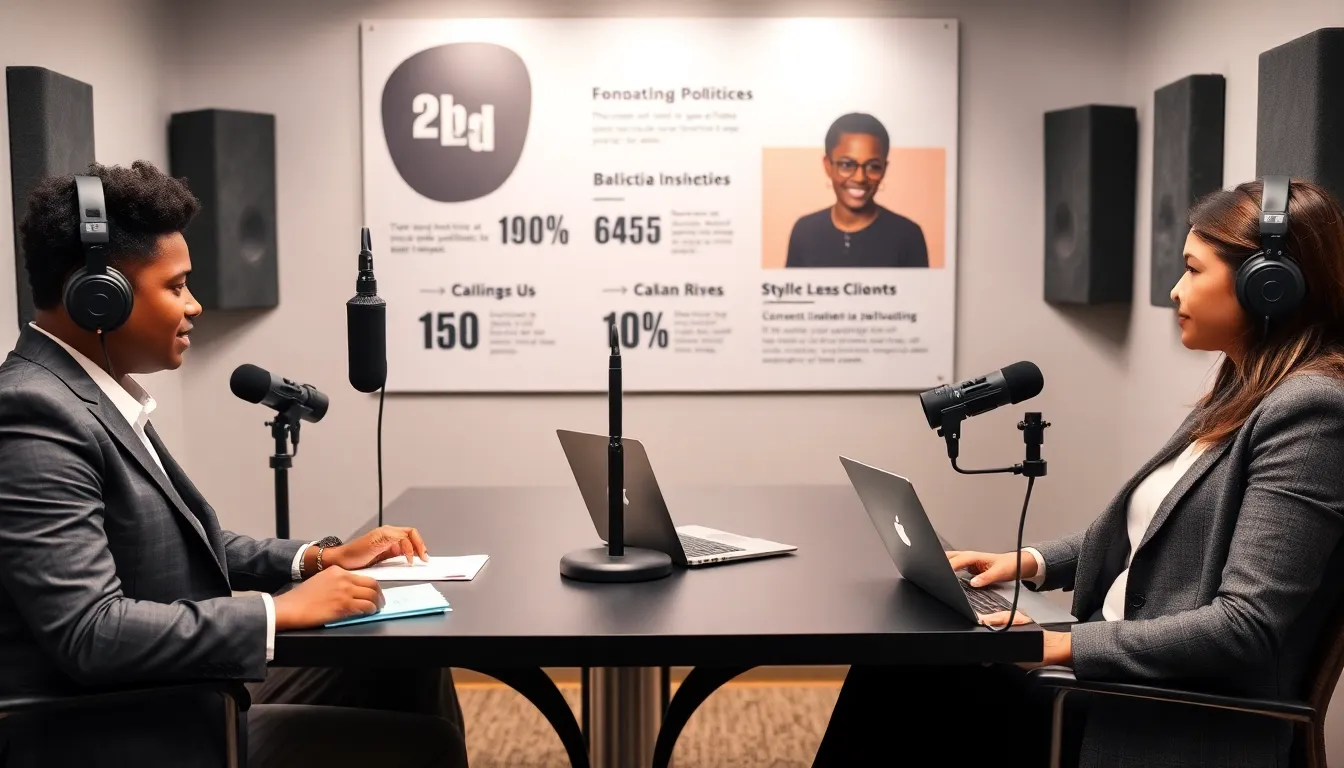Table of Contents
ToggleIn an era where political opinions can feel more like a boxing match than a rational discussion, finding unbiased political podcasts can be akin to searching for unicorns at a petting zoo. It’s no easy feat. But fear not, because this article shines a light on those rare gems, podcasts that offer clear, fact-based insights without the bias you’d find in your social media feeds. So, if you want to tune in and engage in some intelligent discourse without the usual partisan drama, keep reading.
Understanding Unbiased Political Discourse

Unbiased political discourse serves as the cornerstone of a healthy democracy. It involves discussing political themes without subjective slants. Engaging in this form of discourse allows individuals to comprehend issues more fully. Political debates and podcasts often sway listeners through emotional appeals or sensationalism, leading to divisive opinions. Understanding unbiased conversation encourages people to consider alternative perspectives and fosters critical thinking.
At its core, unbiased discourse requires careful examination of facts. This approach facilitates balanced discussions, where listeners feel empowered to form their own opinions rather than being dictated by loud voices or extreme views. So, appreciating unbiased political dialogue eventually benefits society as a whole.
Characteristics of Unbiased Political Podcasts
What sets unbiased political podcasts apart? Several key characteristics define them:
- Fact-Based Content: They prioritize data and facts over sensationalism. Hosts rely on reputable sources to back their claims.
- Diverse Perspectives: These podcasts invite guests from different backgrounds and political stands, ensuring a well-rounded discussion.
- Critical Analysis: Rather than merely stating opinions, they analyze events, policies, and theories critically. In-depth exploration rather than sound bites is the name of the game.
- Consistent Tone: They maintain a calm and balanced tone, steering away from inflammatory language. This helps listeners feel more at ease and willing to engage.
- Transparency: Unbiased podcasts often outline their methodologies and sources. This transparency builds trust with the audience and encourages them to think critically about the information presented.
These characteristics contribute significantly to making political discourse more enriching and educational than ever before.
Top Unbiased Political Podcasts to Follow
When searching for unbiased political podcasts, choices abound. Here are some top picks:
- The Daily: Produced by The New York Times, this podcast delivers daily news seasons that balance reporting with insights into the week’s most pressing issues.
- Pod Save America: While the hosts do lean Democratic, they invite guests from across the political spectrum, fostering conversation rather than conflict.
- You Are Here: This podcast is hosted by conservative and liberal hosts who both aim to promote understanding between differing views.
- The NPR Politics Podcast: NPR consistently earns high marks for unbiased journalism. Their political podcast offers expert analysis without floating into partisan territory.
- FiveThirtyEight Politics: Known for its data-driven approach, FiveThirtyEight dives into political analysis that strips away hype and focuses solely on the numbers.
These selections provide informative, entertaining content without the bias often found in other media.
Analyzing the Impact of Unbiased Podcasts on Political Engagement
The rise of unbiased podcasts has led to a noticeable shift in political engagement. Studies show that listeners of unbiased podcasts report feeling more informed about political issues and are more likely to engage in community discussions. This phenomenon suggests that when discussions rely on facts rather than emotional appeals, people feel empowered to participate.
Listening to unbiased content helps cultivate active citizenship. Individuals become more likely to attend town hall meetings, engage in political activism, or even discuss policy changes with friends. As audiences dive deeper into different viewpoints, they develop empathy and help healthy conversations over divisive issues.
Also, the accessibility of these podcasts makes them appealing to a wider demographic. Anyone can listen on the go, making it easier to integrate political knowledge into daily routines.
How to Assess Objectivity in Political Podcasts
Finding an unbiased podcast is just the beginning. To truly ensure a podcast’s objectivity, listeners should assess the following:
- Source Reliability: Research where the podcast hosts get their information. Are they citing credible sources?
- Guest Selection: Are different viewpoints represented? A balanced selection of guests adds richness to the conversation.
- Tone and Language: Listen for neutrality in the hosts’ language. If they seem to favor one side over another, proceed with caution.
- Episode Structure: A structured episode layout where facts precede opinions often indicates objectivity.
- Transparency: Does the podcast openly discuss its funding sources or any potential biases? This can provide insight into its overall reliability.
These steps equip listeners with the tools necessary to discern the quality of content they consume.
The Future of Unbiased Political Podcasting
What does the future hold for unbiased political podcasting? People increasingly demand open, factual discussions that promote understanding rather than divide. As audience interest grows, it’s likely that more creators will enter this space, expanding the range of perspectives available.
Technological advancements also play a crucial role. Improved algorithms and recommendation tools could help listeners discover more unbiased content tailored to their preferences. Just as social media can amplify divisive rhetoric, it can also help bridge gaps by promoting thoughtful podcasts.
More educational institutions might consider launching podcasts as supplementary learning tools, enhancing their curriculum by encouraging diversified discussions among students and faculty alike.


